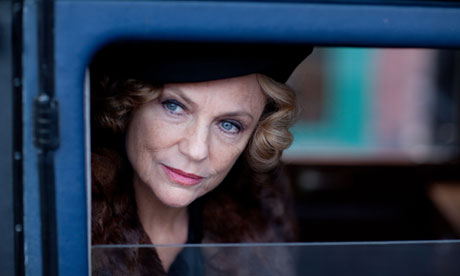
Jacqueline Bisset, who has worked with some of the greatest directors on both sides of the Atlantic over five decades, is returning to Britain to star in a major television drama series by the acclaimed writer-director Stephen Poliakoff.
Dancing on the Edge, to be screened on BBC2 from next month, is set in the early 1930s and follows a group of black jazz musicians who entertain London's upper-class society, encountering racism, class prejudice and nationalism.
Bisset, 68, who was once described by Newsweek as "the most beautiful actress of all time", said the series tells a story that has contemporary parallels, and explained that she had wanted to make more British drama and increase her range of roles.
In an interview with the Observer, the bilingual star of British and French descent said she believed American directors failed to bring out the best in actresses as they were less sensitive to female characters than their European counterparts.
"A lot of [American] directors aren't looking for the detail in those incredible emotions that women can bring, the skin tone or their femininity."
The US-based star added: "I feel that they often don't look. You've got to look at an actor, see what the light does to their face, and whether you can bring out what they have to give. That's what Ingmar Bergman did so brilliantly. Wonderful actresses like Harriet Anderson [star of Bergman classics] – their faces became a human map."
Bisset said she feels that some of the finest European actresses are misused in Hollywood after first making their name at home: "It's shocking to see the difference between their work in Europe and their work in America."
Citing the example of Marion Cotillard – who became a world star with her sensitive depiction of Edith Piaf – she said: "I saw her recently in something American – Batman [The Dark Knight Rises]. They didn't use her well."
Bisset, whose last British film was Murder on the Orient Express in 1974, caused a sensation in the 1977 film The Deep, swimming underwater in little more than a T-shirt; and in light entertainment movies such as the 1967 James Bond spoof Casino Royale, but she proved herself a serious actor in films such as Two for the Road with Albert Finney and Audrey Hepburn, The Detective with Frank Sinatra and Bullitt with Steve McQueen.
She has worked with acclaimed directors such as John Huston, George Cukor, François Truffaut and Claude Chabrol.
Born and raised in England, Bisset has spent much of her life in America, despite never intending to stay there. "I had no aspirations to be part of American cinema … I was really a Europe-based person and those were the films I was inspired by. I came [to America] and fell in love with somebody [actor Michael Sarrazin]. Our careers started to take off and that was it."
She added: "I have emotional strings that tie me to Europe."
Some of the new roles Bisset wants are those depicting working-class characters rather than "silver spoon" women, possibly the reason why she is drawn to French and Swedish films, often "about simple people, village life and just human stuff, personal, psychological films", like Jean de Florette, the French classic.
She added: "There is an eternal humanity that crosses through all people and it's more interesting often when it's about struggle – not people with champagne glasses."
Bisset spoke too of the "great fear" among good-looking male actors of being dismissed as "glamour boys", forcing them to take on "rough-looking" or other inappropriate roles that mask their qualities: "Johnny Depp does all these strange fantasy projects … I felt the same way about Brad Pitt … People are frightened of being typecast."
She is particularly concerned by television's depiction of women and, "the obsession with showing large amounts of flesh. There's something so desperate about it, almost sad," she said. "Television is portraying women as monstrously lascivious, oversexed dolls and it's scary… It spreads into the [wider] culture."
Bisset also believes actors should beware of appearing in too many films, adverts and magazines because overexposure harms career longevity . She said: "A lot of actors work too much. There comes a point where it's hard to mask your basic personality. It's a bit like a relationship. If you're always there, they can't desire you."

